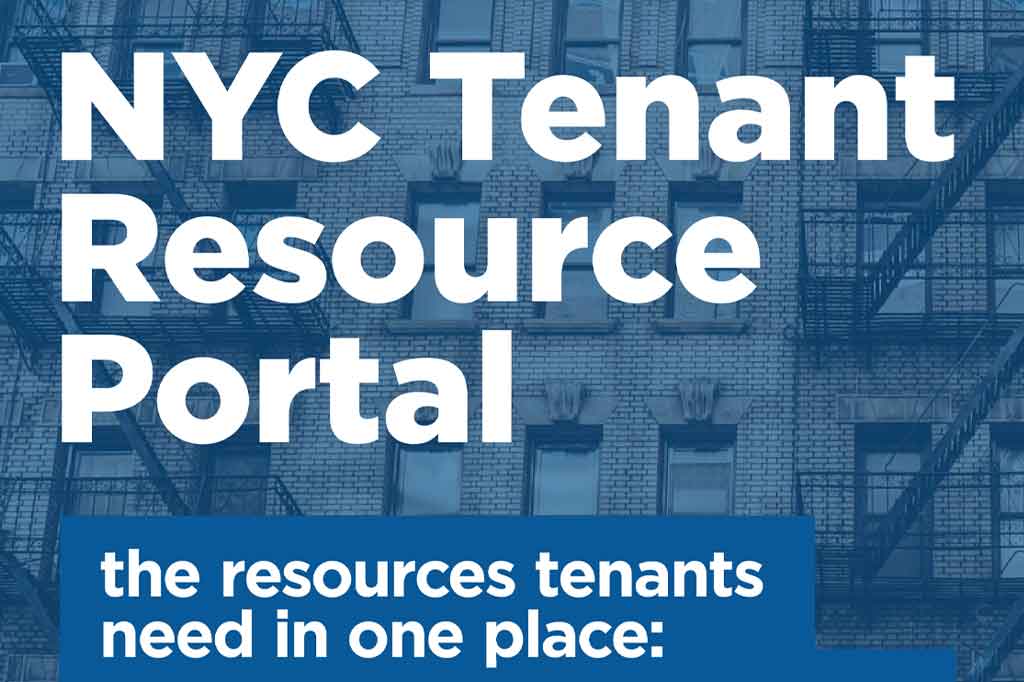
Don’t Get Lost in the Lease: My Ultimate First-Person Guide to Renting Your First NYC Apartment
Introduction: My NYC Apartment Hunting Journey – And How You Can Conquer Yours
If you’ve landed here, chances are you’re about to rent your first apartment in New York City, or maybe you’re just seriously contemplating the big move. Either way, let me be the first to say—congratulations! Taking the leap to live in the Big Apple is an incredibly exciting, empowering, and yes, let’s be honest, a slightly overwhelming adventure. I should know, because I’ve been exactly where you are right now.
A few years ago, I packed my life into two suitcases, fueled by a dream and a healthy dose of naivety, and moved to New York. What I didn’t have, unfortunately, was a realistic understanding of just how brutal the NYC rental process could be. I’m talking about everything from brokers who seemed to speak in riddles, to apartment listings with photos that belonged in a fantasy novel, to the mind-numbingly complex fine print in lease agreements. Trust me, I’ve seen it all, and I’ve probably made every rookie mistake you can imagine.
That’s precisely why I decided to create this blog. I wanted to share the real, unfiltered, practical tenant advice that I wish I’d had. My goal is to help you, and others like you, avoid the costly mistakes I made, and to provide a reliable, trustworthy NYC rental guide that you can actually use. Think of me as your friendly neighborhood guide to navigating the concrete jungle’s housing market. I’m here to demystify the process, share my hard-earned lessons, and ultimately, help you find a great place to call home without losing your mind (or your savings!). So, grab a coffee, get comfortable, and let’s dive into everything you need to know about renting your first apartment in New York City. I’m here to bridge that gap I found in the NYC rental scene – the one where so many hopeful tenants fall through. Through my experiences, detailed reviews, SEO-powered apartment search tips, and practical tenant advice, I’m aiming to make your journey smoother than mine was. Let this post be your first, most important step towards successfully landing that NYC apartment.

New Beginnings in the Big Apple
Understanding the NYC Rental Beast: Key Trends and Neighborhood Vibes I Wish I Knew Sooner
Before you even start scrolling through those tempting apartment listings, it’s crucial to get a handle on the ever-evolving NYC rental market. I learned this the hard way. Keeping up with current trends isn’t just for industry insiders; it can genuinely help you make smarter decisions and set realistic expectations. Here’s what I’ve noticed shaping the market lately, and some neighborhood insights that could save you a lot of guesswork.
What’s Hot (and Not-So-Hot) in the NYC Rental Market Right Now
The NYC rental scene is a living, breathing entity, constantly shifting. Here are a few key trends I’ve seen making waves:
- The Price is (Still) Quite Right (High, That Is): Let’s not sugarcoat it: rental prices in NYC, especially in those super popular neighborhoods, have been on an upward trajectory. When I first started looking, I had a bit of sticker shock. It’s so important to set a realistic budget from day one and be mentally prepared for potential increases, even year over year. I remember seeing a place I loved, only to find out the rent was 10% higher than a similar unit a year prior. Ouch.
- The WFH (Work From Home) Effect: The shift towards remote work has definitely changed what people are looking for. I’ve noticed more and more friends and fellow renters prioritizing apartments with dedicated home office spaces or at least a nook that can be converted. Access to outdoor space, even a small balcony or shared patio, has also become a huge selling point. My first apartment was a tiny studio, and after a year of working from my kitchen table, I knew my next place had to have a bit more room to breathe.
- The Short-Term Shuffle: There’s a noticeable uptick in interest for short-term rentals. I think this is partly due to people wanting more flexibility and not wanting to be locked into long-term commitments, especially if their job situation is a bit fluid. While it can be pricier per month, for some, the convenience outweighs the cost.
- Competition is Fierce – Be Prepared to Pounce: With more people flocking back to the city or moving within it, the competition for desirable apartments is no joke. I learned quickly that if you see something you like, you need to be ready to act fast. That means having all your necessary documents (we’ll get to those later!) organized and ready to go. I missed out on a great one-bedroom in Brooklyn because I wasn’t prepared enough, and someone else swooped in.
To give you a clearer picture, here’s a rough idea of what I’ve seen average rental prices looking like for different apartment types. Keep in mind, these can vary wildly by borough and even by block!
| Apartment Type | Average Monthly Rent (Expect Variation!) |
|---|---|
| Studio | $2,500 – $3,500+ |
| 1 Bedroom | $3,200 – $4,500+ |
| 2 Bedroom | $4,500 – $6,000+ |
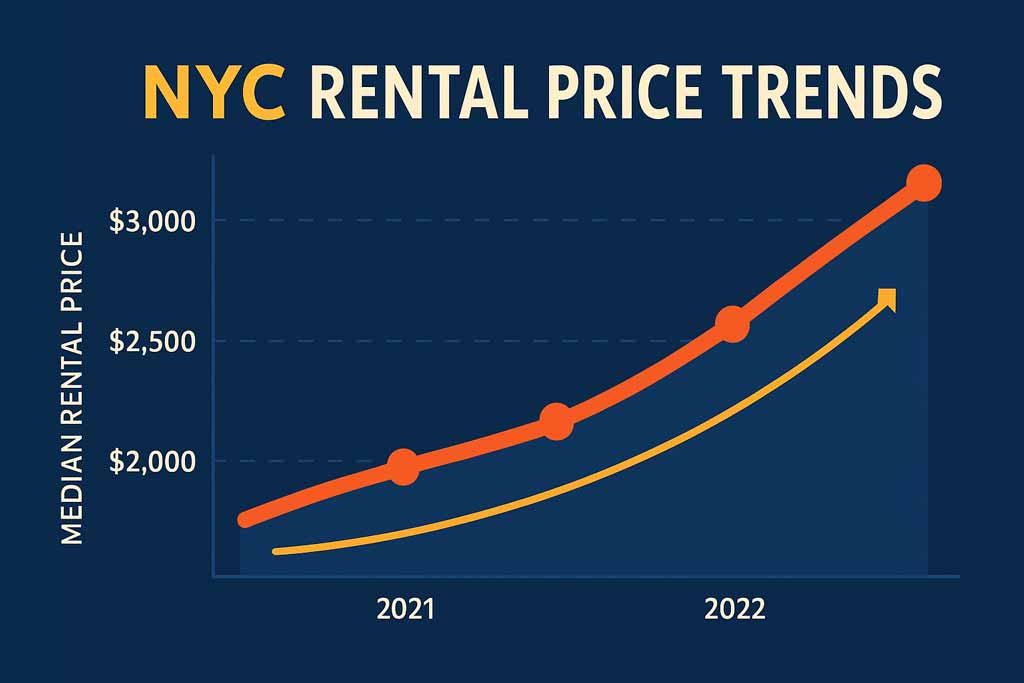
NYC rental price trends 2021 to 2023
Finding Your Tribe: A Personal Take on NYC Neighborhoods
Every NYC neighborhood has its own distinct personality, its own unique charm and quirks. Understanding these dynamics is about more than just finding a place to live; it’s about finding a place where you’ll feel at home. Here’s my take on a few areas, based on my own explorations and what I’ve heard from friends:
- The Upper East Side (UES): I always pictured the UES as very “Gossip Girl” – classic architecture, doormen, and proximity to Museum Mile. It’s definitely got that sophisticated vibe and is popular with families and professionals who appreciate a quieter, more established atmosphere. My friend Sarah loves it there for the park access and the slightly more residential feel compared to downtown.
- Brooklyn (Williamsburg, Bushwick, Park Slope, etc.): Oh, Brooklyn. It’s so diverse. You’ve got the trendy, artsy vibes of Williamsburg and Bushwick, with their cool cafes and street art, attracting a younger crowd and creative types. Then there are areas like Park Slope, which are super family-friendly with beautiful brownstones and, of course, Prospect Park. I spent a lot of time apartment hunting in Brooklyn because I loved the blend of historic charm and modern amenities.
- Queens (Astoria, Long Island City, Flushing, etc.): Queens is incredibly diverse and often more affordable than Manhattan or parts of Brooklyn. Astoria, for example, has a fantastic Greek community and a more laid-back feel, while Long Island City offers stunning skyline views and new developments. If you’re looking for a bit more space for your money or a more suburban feel with easy city access, Queens is definitely worth exploring. I had a colleague who found an amazing two-bedroom in Astoria for what a studio would cost in Manhattan.
- Lower Manhattan (East Village, West Village, SoHo, etc.): This is where the energy is palpable. Think vibrant nightlife, iconic cultural landmarks, and a generally faster pace. The East Village has a grittier, bohemian history that still shines through, while the West Village is all charming cobblestone streets and cute boutiques. SoHo is your go-to for high-end shopping. It definitely appeals to young professionals and singles who want to be in the heart of the action. My first NYC dream was to live in the West Village, but my budget had other ideas!.
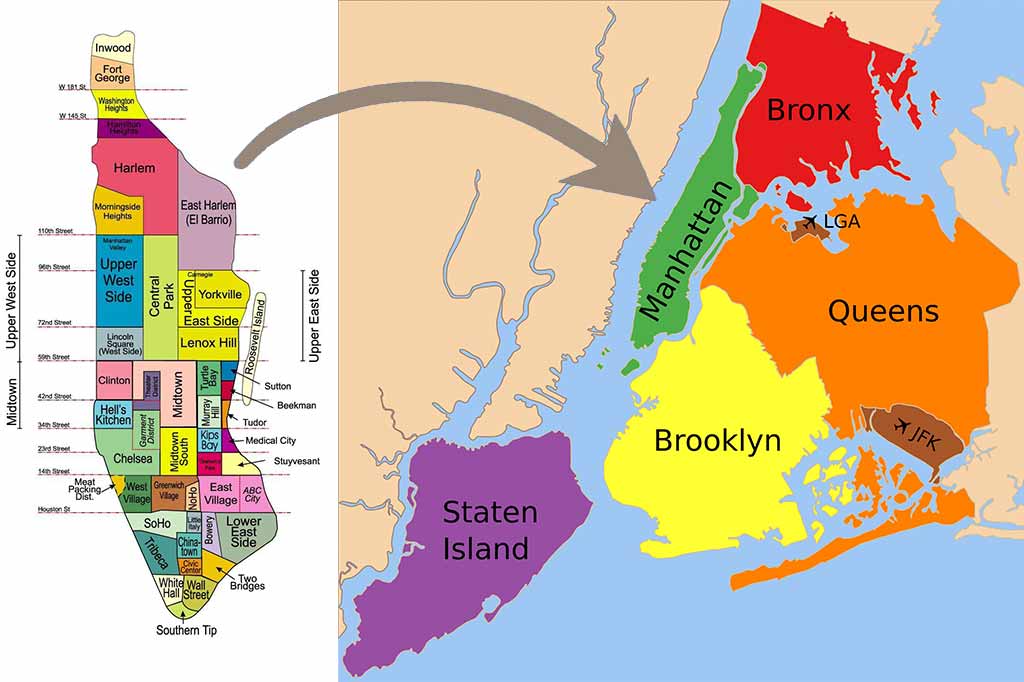
1 Map of Manhattan Neighborhoods. 2 Map of New York city boroughs.
When I was trying to narrow down neighborhoods, I made a checklist. To make a well-informed decision that truly aligns with your lifestyle, I recommend you consider these factors too:
- Commute, Commute, Commute: How close is it to public transportation? What will your daily trek to work or school look like? I learned to use the MTA Trip Planner religiously.
- Local Flavor: What amenities are nearby? Are there grocery stores, parks, gyms, coffee shops, and laundromats within easy reach? These everyday conveniences make a huge difference.
- Safety First: How safe does the area feel, both day and night? I always made a point to visit potential neighborhoods at different times.
- The Vibe Check: What’s the general atmosphere like? Is it bustling and loud, or quiet and residential? Does it match your personality and what you’re looking for in a community?
Trust me, understanding these neighborhood dynamics isn’t just about finding an apartment; it’s about finding your little corner of NYC where you can truly thrive. It ensures that your new home aligns with your needs and lifestyle, making your NYC adventure that much sweeter.
Budgeting for Your NYC Dream (Without Eating Instant Noodles for a Year)
Okay, let’s talk money. Finding an apartment in NYC is exciting, but it can also be a serious drain on your finances if you’re not careful. I learned this lesson the hard way when I first moved. One of the absolute most crucial steps in this whole adventure is budgeting for your rent. Understanding your financial limits isn’t just about being responsible; it’s about making informed decisions that will save you a ton of stress down the line. Renting in New York City is notoriously expensive, so trust me, being prepared can make all the difference between landing your dream pad and, well, eating a lot of instant noodles.
🏙️ Setting Your Realistic Rent Budget: A No-Nonsense NYC Guide
Before you even start scrolling through glossy apartment listings on StreetEasy, stop and get real about your budget. Setting your financial boundaries early means you’ll focus only on homes you can actually afford.
When I started apartment hunting, I made the rookie mistake of looking at places just slightly above my budget thinking, “Oh, I’ll make it work.” Spoiler alert: I couldn’t. And it only led to stress.
Here’s a simple, no-fluff breakdown to help you figure out exactly how much rent you can afford.
Step 1: Know Your Monthly Income
Start with your net income — what you actually take home after taxes. Include all consistent income streams (job, side hustle, etc.). Be honest.
Step 2: List Monthly Non-Negotiable Expenses
Make a list of your essential living costs, such as:
- Student loans or credit card payments
- Groceries and transportation (yes, your MetroCard!)
- Phone, internet, and subscriptions
- Savings and a bit for your social life (you’re in NYC!)
Step 3: Calculate Disposable Income
Now subtract your total expenses from your monthly net income.
👉 That leftover amount is your maximum budget for rent + utilities.
📏 The 40x Rule (Landlord Standard)
Most NYC landlords want your annual gross income to be at least 40 times your monthly rent.
Example:
- Rent = $3,000/month
- You’d need to earn $120,000/year
- If you don’t meet this, you’ll need a guarantor (often a parent or relative) who earns 80x the monthly rent
💡 The 30% Rule (Personal Finance Standard)
Financial advisors often say: Don’t spend more than 30% of your gross monthly income on rent.
This rule helps ensure your rent won’t eat into money you need for everything else. If the math doesn’t work out, it’s time to adjust your expectations.
Instead of doing math in your head — use this free calculator below to instantly see your ideal rent budget based on both rules 👇
Find out how much rent you can afford:
🏠 Calculate Here
If your 30% rent target is way above what you can actually afford after paying your bills — that’s your reality check. You may need to:
- Lower your expectations
- Find a roommate
- Or explore cheaper neighborhoods
Trust me, it’s better to love your home and afford it, than to live somewhere fancy but be constantly broke.
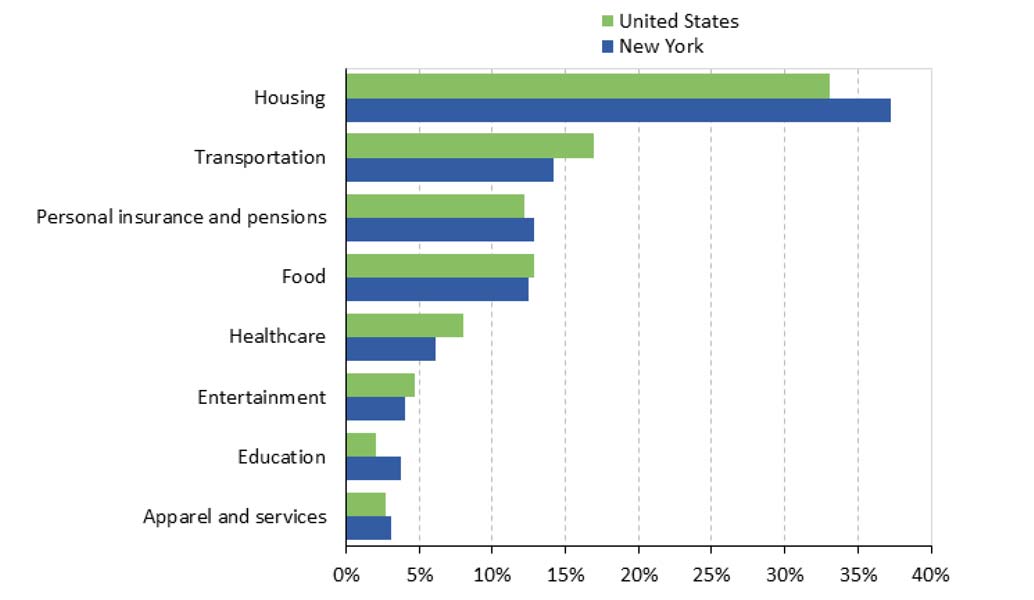
Shares of average expenditures for selected major components in the
United of States and New York metropolitan area, 2022-2023
Source: U.S. Bureau of Labor Statistics.
Unmasking the Hidden Costs: What I Wish Someone Had Told Me
Renting an apartment in NYC involves so much more than just the monthly rent. I was a bit naive about this at first, and the “hidden” costs definitely added up. Being aware of these upfront will help you prepare and avoid nasty surprises. Here are some of the common ones I encountered:
- The Security Deposit: This is almost always one month’s rent, but I’ve seen some landlords ask for two, especially if your credit isn’t stellar or if you’re new to renting. The good news is, you get this back when you move out, provided you haven’t trashed the place.
- Broker Fees – The NYC Rite of Passage (Sometimes): Ah, the infamous broker fee. If you use a real estate broker to find your apartment (which is very common in NYC), you’ll likely have to pay their fee. This can be anywhere from one month’s rent up to 15% of the annual rent. Yes, you read that right. It’s a hefty sum, so factor it in. I managed to find a “no-fee” apartment for my second place, but my first one had a broker fee that made my eyes water. We’ll talk more about “no-fee” apartments later, because they’re not always as straightforward as they sound.
- First Month’s Rent: You’ll need to pay this upfront, along with your security deposit and any broker fee, before you even get the keys. So, you could be looking at paying three to four months’ rent all at once. Start saving!
- Utility Bills (Con Ed is Not Your Friend in Summer): Not all rentals include utilities like electricity, gas (for cooking and heat), hot water, and internet in the rent. I learned to always ask specifically what’s covered. My first Con Edison (electricity and gas) bill during a hot NYC summer was a shocker thanks to my old, inefficient window AC unit.
- Moving Costs: Whether you’re hiring professional movers (which can be pricey but a lifesaver, especially with NYC’s walk-up buildings) or renting a U-Haul and bribing friends with pizza, moving isn’t free. I’ve done both, and each has its pros and cons.
- Pet Fees (If Fido is Coming Along): If you have a furry friend, expect potential additional fees. This could be a one-time pet fee, a monthly pet rent, or an additional pet security deposit. I had to pay an extra $50 a month for my cat, but it was worth it!
- Application Fees/Credit Check Fees: Some landlords or management companies charge a small fee (usually $20-$100) to process your application and run a credit check.
Being aware of these costs from the start helps you create a much more realistic moving budget. I always recommend asking direct questions about all potential fees before you even sign a lease. Understanding the full cost of renting is key to staying within your budget and avoiding those unwelcome financial surprises that can really dampen the excitement of your new NYC life. This knowledge will help you manage your finances effectively and keep your apartment journey a positive one.
Finding Your Perfect NYC Apartment: My Search Strategies That Actually Worked
Alright, you’ve got your budget sorted (phew!), and you have a better idea of the neighborhood vibes you’re after. Now for the exciting, and sometimes overwhelming, part: actually finding that perfect apartment. When I first started my search, it felt like trying to find a needle in a haystack – a very large, very competitive haystack! But over time, and through a bit of trial and error, I developed some strategies that really helped me navigate the NYC rental market. Whether you’re a first-time renter like I was, or you’re just looking to upgrade, knowing the best ways to find your perfect place is absolutely key. I found that a combination of online savvy and old-school local exploration was the winning ticket.
Mastering the Digital Hunt: My Go-To Online Platforms
In today’s world, online platforms are pretty much essential tools for apartment seekers in NYC. I honestly don’t know how people did it before the internet! They offer an incredibly convenient way to browse thousands of listings without even having to leave your couch (though I recommend eventually getting off the couch to see places in person!). Here’s why I found them so useful:
- Endless Options (Almost): The sheer volume of listings is incredible. You can access a super diverse range of apartments across all five boroughs, from tiny studios to sprawling multi-bedroom places.
- Filter Power: This was a lifesaver for me. Being able to narrow down search results by price, size (number of bedrooms/bathrooms), specific amenities (doorman, in-unit laundry – the dream!), and pet policies saved me so much time and heartache. I knew I needed a cat-friendly place, so that was always my first filter.
- Virtual Sneak Peeks: Many platforms now offer virtual tours, 3D walkthroughs, or at least a good number of photos. While I always recommend seeing a place in person before signing anything, these virtual options were great for initial screening and helped me decide if an apartment was even worth a visit.
My personal go-to websites, and the ones I still browse just for fun sometimes (don’t judge!), were:
| Platform | My Favorite Features |
|---|---|
| StreetEasy | Hands down, the most comprehensive for NYC. I loved their neighborhood guides, market trend data, and the sheer number of listings. It’s very NYC-centric. |
| Zillow | Also a big player. I found their interactive maps and Zestimate rental estimates helpful for getting a general sense of pricing in an area. |
| Apartments.com | They often had 3D tours which were great, and their rent calculator was a handy tool. |
| Zumper | Good for filtering by price and specifically for “no-fee” apartments, which I became obsessed with finding during my second apartment hunt. |
| JustBengals | It’s NYC-focused and felt way more personal than the big platforms. I find everything from room shares in Queens to full apartments in Manhattan. |
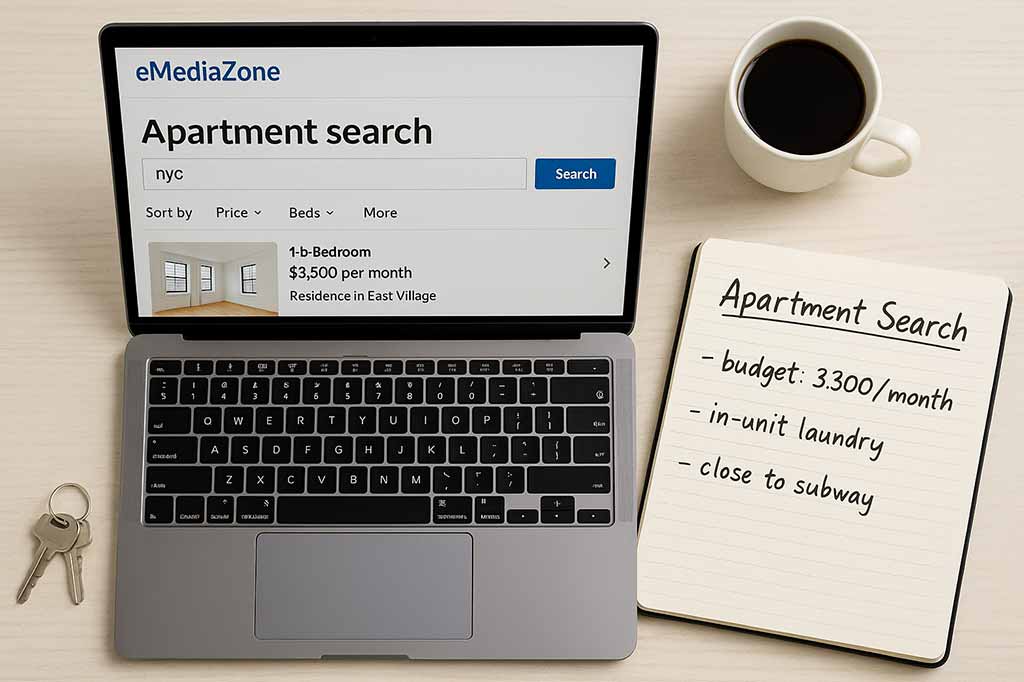
Apartment Hunting Essentials
My biggest tip for using these platforms effectively? Set up alerts! Seriously, this is a game-changer in the fast-paced NYC market. As soon as an apartment that matched my specific criteria (neighborhood, price, size, pet-friendly) hit the market, I’d get an email or app notification. This way, I could be one of the first to reach out and schedule a viewing. I snagged my current apartment because I responded to an alert within an hour of it being listed!
Boots on the Ground: The Power of Local Listings and Word-of-Mouth
While online platforms are fantastic, I also learned that you shouldn’t underestimate the value of local listings and good old-fashioned word-of-mouth. Sometimes, the real gems are found offline. Here’s what I explored:
- Community Bulletin Boards: You know those corkboards in local coffee shops, laundromats, grocery stores, and community centers? I actually found a couple of interesting leads by checking these out, especially for rooms for rent or apartments in smaller, owner-occupied buildings. These often have direct contact info for the landlord, which can be a plus.
- Talk to People!: This sounds so simple, but it’s surprisingly effective. I told everyone I knew that I was apartment hunting – friends, colleagues, even my barista. You never know who might have a lead. My friend’s cousin was moving out of her rent-stabilized place and gave me a heads-up before it was officially listed. I didn’t end up taking it, but it was an amazing opportunity that I wouldn’t have found online.
- Neighborhood Newspapers & Local Blogs: Some smaller, independent landlords still advertise in local community papers or on neighborhood-specific blogs or social media groups. These can be less competitive than the big websites.
- Just Walk Around: This was actually one of my favorite (and most effective) strategies, especially once I’d narrowed down a few target neighborhoods. I would just wander the streets, looking for “For Rent” signs in windows. This is particularly common in smaller buildings or brownstones where the landlord might live on-site and prefer to rent to someone they meet in person. I discovered some charming streets and buildings this way that I never would have found on a map.

The Search Begins: Finding Available Rentals
Here’s why I think these local sources are worth your time:
| Local Source | My Take on the Advantages |
|---|---|
| Community Bulletin Boards | Often direct contact with landlords, potentially unique or unlisted apartments. |
| Word-of-Mouth | Trustworthy recommendations, potential for off-market listings, insider info. |
| Neighborhood Newspapers | Access to hyper-local listings, sometimes less competition than big online platforms. |
| Walking Around | Discovering hidden gems, getting a real feel for the block, direct landlord interaction. |
My advice? Don’t put all your eggs in one basket. I found that the most successful apartment hunters (myself included, eventually!) combine the efficiency of online research with the valuable insights you gain from local exploration. It takes a bit more effort, but it significantly increases your chances of finding an apartment that not only meets your needs but also feels like home. Happy hunting!
The All-Important Apartment Viewing: My Checklist for Spotting a Gem (or a Dud)
So, you’ve lined up some viewings – exciting! This is where the rubber meets the road, or rather, where your shoes meet potentially grimy apartment floors. I learned that the apartment viewing is a critical step. It’s your chance to really assess the space, look beyond the (potentially misleading) listing photos, and ensure it truly meets your needs. I developed a mental checklist over time, and I also learned that asking the right questions can reveal a goldmine of information (or red flags!).
What My Eyes (and Nose!) Look For: Key Features to Examine
When I walk into a potential apartment, I try to engage all my senses. Here are the key things I always make a point to inspect closely:
- The Overall Condition – Don’t Be Shy, Look Closely! I check for any obvious signs of wear and tear, or worse, neglect. Are there cracks in the walls, water stains on the ceiling (a big red flag for leaks!), scuffed or damaged floors? I also pay attention to cleanliness. A dirty apartment at a viewing doesn’t bode well for how it’s been maintained. I once viewed a place that looked great in photos, but in person, there was a distinct smell of mildew – dealbreaker!
- Let There Be Light (Hopefully): I’m a big believer in natural light. It just makes a space feel more cheerful and can even save on electricity bills. I always observe how much natural light enters the apartment at the time of viewing and try to imagine what it would be like at different times of the day. Which direction do the windows face? Are they blocked by other buildings?
- Space, Layout, and Flow – Will Your Stuff Fit? This is crucial. I try to visualize my furniture in the space. Is the layout practical? Will my bed fit in the bedroom and still leave room to walk around? Is there enough closet space (a rare commodity in NYC!)? I learned to bring a small tape measure to viewings to quickly check dimensions if I was serious about a place.
- Utilities and Appliances – The Nitty-Gritty: I always inspect the appliances that come with the apartment (stove, oven, refrigerator, dishwasher if you’re lucky). Do they look clean and in good working order? I also test the water pressure in the sinks and shower – low water pressure is a daily annoyance I try to avoid. I check the heating and cooling systems too. Are there radiators? Window AC units (and are they included, or will you need to buy your own)? Central air (the ultimate NYC luxury!)?
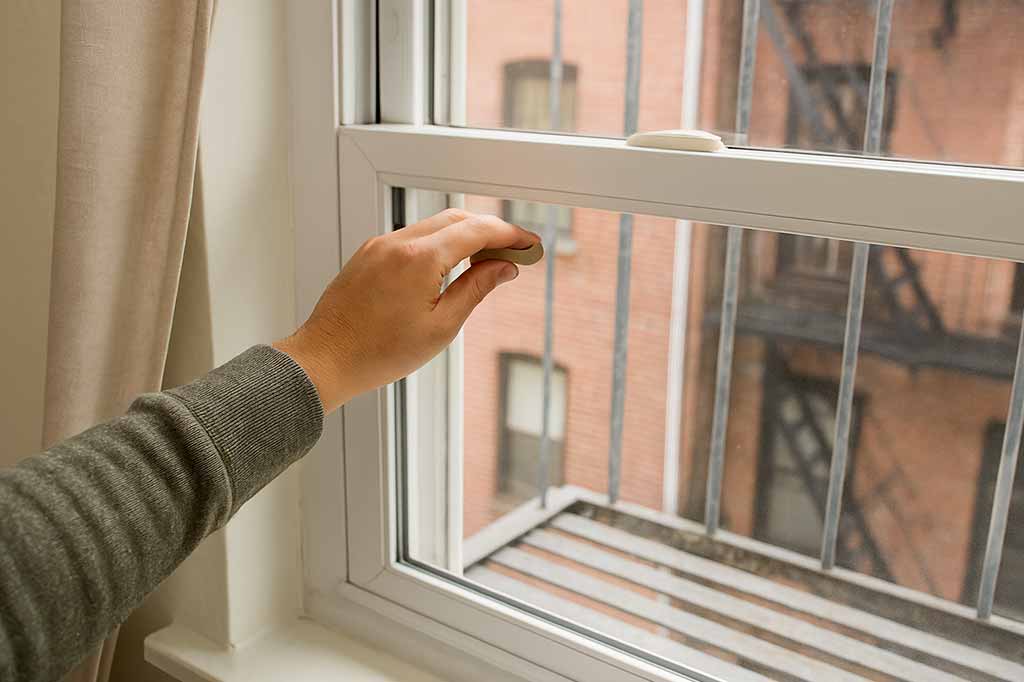
Apartment Inspection: What to Look For
To keep things organized, especially if you’re seeing multiple places in a day (which I often did – it’s like a marathon!), here’s a little table summarizing what I focus on:
| Elements to Check | My Key Inspection Points |
|---|---|
| Apartment Condition | Walls (cracks, paint), floors (damage, cleanliness), ceilings (stains, leaks), general upkeep, any strange smells. |
| Natural Light | Amount of light, window direction, potential obstructions, overall brightness. |
| Space & Layout | Room sizes, closet space, furniture placement potential, flow between rooms. |
| Utilities & Appliances | Condition of stove/fridge/etc., water pressure (sinks, shower), heating/cooling systems, evidence of pests. |
| Windows & Doors | Do they open/close properly? Are there screens? Do locks seem secure? |
| Noise Levels | Street noise, neighbor noise (if possible to tell), building sounds. |
The Questions I Always Ask (And You Should Too!)
Beyond just looking, talking to the broker, landlord, or current tenant (if they’re present) is invaluable. I learned that asking direct, specific questions can save a lot of headaches later. Don’t be shy – this is a big decision!
Here are some of my go-to questions:
- What utilities are included in the rent?
This is a big one for budgeting. Is heat included? Hot water? Gas? Electricity? Internet/cable? I always get this clarified upfront. - Are there any additional fees I should be aware of?
Beyond the rent and security deposit, are there amenity fees (for a gym or roof deck), move-in/move-out fees, pet fees (if applicable), or late payment penalties? I like to know all the potential costs. - How is maintenance handled, and who do I contact for repairs?
This is super important. Is there a building superintendent (a “super”)? What’s the typical response time for repairs? I once lived in a building with an absentee landlord, and getting anything fixed was a nightmare. Knowing the process beforehand is key. - What’s the neighborhood like in terms of safety, noise, and amenities?
While I do my own research, it’s always interesting to hear the perspective of someone familiar with the building. They might mention things you wouldn’t notice on a brief visit, like if a nearby bar gets noisy on weekends or if there’s construction planned next door. - What’s the lease duration, and are there any options for renewal?
Most NYC leases are for one year, but it’s good to confirm. I also ask if there’s a standard procedure or likelihood for lease renewal, and if so, what kind of rent increase is typical (if they can say). - What’s the policy on alterations?
Can I paint the walls? Hang shelves? I always ask before assuming, as some landlords are stricter than others. - Why are the current tenants moving (if applicable)?
This can sometimes be very revealing! If they’re cagey or mention issues with the building or landlord, it’s a potential red flag. - What is the application process and timeline?
If I like a place, I want to know what’s next. What documents are needed? How long does approval usually take? In a competitive market, speed can be crucial.
Asking these questions not only gives you vital information but also shows the landlord or broker that you’re a serious and diligent prospective tenant. Trust me, a little bit of inquisitiveness during the viewing can save you a world of trouble down the road and help you make a confident decision about your future NYC home.
Decoding the Lease: My Tips for Negotiating (Yes, You Can!) and Understanding Your NYC Rental Agreement
Alright, you’ve found “the one” – an apartment that ticks most (if not all) of your boxes. Congratulations! But before you pop the champagne, there’s one more crucial hurdle: the lease agreement. I used to think leases were non-negotiable, take-it-or-leave-it documents. But I’ve learned that while many terms are standard, there can be room for discussion, and understanding every clause is absolutely paramount. Negotiating the lease, or at least fully comprehending it, is a vital step in securing your ideal NYC apartment and ensuring a smooth tenancy.
Lease Lingo 101: Key Terms I Learned to Look For
NYC lease agreements can be dense and full of legal jargon. Before you even think about negotiating, it’s essential to thoroughly understand what you’re signing. Here are some key terms and clauses I always pay close attention to:
- Lease Duration (Term):
This specifies how long your rental agreement is valid. Most NYC leases are for 12 months, but I’ve seen shorter (6 months) or longer (24 months) terms. Make sure it aligns with your plans. I once almost signed a 2-year lease when I only intended to stay for one – always double-check! - Rent Amount and Due Date:
Obviously crucial. Confirm the exact monthly rent and the day it’s due (e.g., the 1st of the month). Also, check for any grace period for late payments and what the late fees are. Some landlords are stricter than others. - Security Deposit:
The lease will specify the amount of the security deposit and the conditions under which it will be returned when you move out. Pay attention to clauses about wear and tear versus actual damage. - Maintenance and Repair Responsibilities:
This is a big one. The lease should clarify who is responsible for what. Generally, the landlord is responsible for major repairs (plumbing, heating, structural issues), while tenants might be responsible for minor things or damage they cause. I always look for clarity on how to report issues and the expected timeframe for repairs. - Use of Premises:
This clause usually states that the apartment is for residential use only. It might also have rules about roommates, guests, or subletting. If you’re planning on having a roommate who isn’t on the lease, or if you think you might want to sublet down the line, you need to understand these terms very carefully. - Rules and Regulations (Riders):
Often, leases will have attached “riders” or addendums that outline specific building rules – things like pet policies, noise restrictions, garbage disposal procedures, smoking policies, or rules for using common areas (like a roof deck or gym). I make sure to read every single one of these. - Renewal Terms:
Does the lease mention anything about renewal? Some do, some don’t. It might specify how much notice you need to give if you don’t plan to renew, or how the landlord will notify you of a renewal offer and any potential rent increase.

Read & Understand Your Lease Agreement
Here’s a quick reference table I wish I’d had, summarizing some of these common lease terms:
| Lease Term | My Quick Explanation |
|---|---|
| Lease Duration (Term) | How long you’re renting for (e.g., 12 months, 24 months). |
| Security Deposit | Money the landlord holds as collateral for damages; returned if you leave the place in good shape. |
| Rent Increase Clause | Details if, when, and potentially by how much your rent can go up (often upon renewal). |
| Maintenance & Repairs | Who fixes what (e.g., landlord for leaky pipes, tenant for a lightbulb). |
| Subletting & Assignment | Rules about letting someone else live in your apartment temporarily or take over your lease. |
| Default & Eviction | Conditions under which you could be considered in violation of the lease, potentially leading to eviction. |
My Strategies for (Politely) Negotiating Your Lease
Once you understand the lease terms, you might find a few points you’d like to discuss or even negotiate. Now, I’m not saying you can rewrite the entire lease, especially in a competitive market or with a large management company. But in some situations, particularly with smaller landlords or if you’re a strong applicant, there can be wiggle room. Here are a few strategies I’ve considered or used:
- Do Your Homework – Know the Market:
Before you negotiate, research comparable rentals in the area. If the asking rent is significantly higher than similar apartments, or if the unit has been vacant for a while, you might have a bit more leverage. I once successfully negotiated a slightly lower rent because I showed the landlord listings for two very similar, cheaper apartments on the same block. - Highlight Your Strengths as a Tenant:
Landlords want reliable, responsible tenants who will pay rent on time and take care of the property. If you have excellent credit, stable income, and glowing references from previous landlords, make sure they know it! Sometimes, being a “low-risk” tenant can make a landlord more flexible on certain terms. - Negotiate on “Extras” or Specific Clauses:
Maybe the rent itself is firm, but you could ask for other concessions. For example:- A fresh coat of paint before move-in? (Especially if the current paint job is tired).
- Permission to make a specific alteration? (Like installing a particular type_of shelf, with the understanding you’ll remove it and patch the wall when you leave).
- A slightly earlier move-in date without paying pro-rated rent? (If the apartment is already vacant).
- Clarification or slight modification of a specific building rule? (Perhaps a pet weight limit if your well-behaved dog is just over).
- Focus on a Win-Win: Frame your requests reasonably and explain your rationale. The goal isn’t to strong-arm the landlord but to reach an agreement that works for both of you. I’ve found that being polite, professional, and clear about what I’m asking for goes a long way.
- Be Prepared to Walk Away (But Know When to Hold ‘Em): This is a tough one, especially if you love the apartment. But if a landlord is completely inflexible on a term that is a deal-breaker for you (and it’s a reasonable concern), you have to be prepared to look elsewhere. Conversely, don’t let a minor, non-critical point derail your chance at a great apartment.
Remember, effective communication is key. Be clear, polite, and firm (but fair) about your needs. And most importantly, get everything in writing! Any changes or agreements made verbally should be added as a written addendum to the lease and signed by both you and the landlord. This protects everyone and prevents misunderstandings down the line. I learned this the hard way when a verbal agreement about move-in date wasn’t honored because it wasn’t in the lease. Lesson learned!
Know Your Power: A Tenant’s Guide to NYC Rights (Because I Learned the Hard Way)
Navigating the NYC rental market is tough enough, but understanding your rights as a tenant? That’s a whole other level of crucial. When I first started renting, I was pretty clueless about my legal protections, and honestly, it left me feeling vulnerable. But knowledge is power, especially in a city like New York. Knowing your tenant rights isn’t just about being informed; it’s about protecting yourself from unfair practices and ensuring you have a safe, fair, and habitable place to live. Let me share what I’ve learned, so you can feel empowered too.
Your Fundamental Rights as an NYC Tenant: The Non-Negotiables
Tenants in New York City have a surprising number of legal protections under state and city laws. These aren’t just suggestions; they’re requirements that landlords must follow. Here are some of the key rights I’ve come to understand and appreciate:
- The Right to a Habitable Home (This is a BIG one!): This is probably the most fundamental right. Your landlord has a legal obligation, known as the “warranty of habitability,” to keep your apartment and the building in a safe, clean, and livable condition. This means things like working plumbing, safe electrical wiring, heat and hot water (especially during “heat season” from October 1st to May 31st – landlords have specific temperature requirements they must meet!), and an environment free from pests (like rodents or roaches – ugh, I’ve had my battles!). If your landlord fails to make necessary repairs and conditions become unsafe or unlivable, you have recourse. I once had a landlord who was slow to fix a leak, and knowing my rights helped me push for a quicker resolution.
- Protection Against Discrimination: It’s the Law: This is incredibly important. Landlords cannot refuse to rent to you, or treat you differently, based on your race, color, religion, national origin, sex, gender identity, sexual orientation, age, disability, marital status, family status (e.g., if you have children), or lawful source of income (like if you use a housing voucher). If you feel you’ve been discriminated against, there are city and state agencies you can report it to. I’ve heard stories, and it’s good to know this protection exists.
- The Importance of a Written Lease: While oral agreements can exist, I always recommend getting a written lease. This document outlines the terms and conditions of your tenancy and protects both you and the landlord. It should clearly state the rent amount, lease duration, rules, and responsibilities. I make sure to read every word and keep a copy in a safe place.
- Security Deposit Safeguards: Your Money, Their Responsibility: NYC has specific rules about security deposits. For instance, it generally cannot be more than one month’s rent (for most unregulated apartments). Your landlord must also hold your security deposit in an interest-bearing account in a New York bank and inform you of the bank’s name and address. When you move out, if you’ve left the apartment in good condition (normal wear and tear excepted) and paid all your rent, the landlord must return your deposit within a “reasonable time” (typically interpreted as within 14 days after you vacate). They also have to provide an itemized list of any deductions. I learned to take thorough photos before moving in and before moving out to document the apartment’s condition – it’s great evidence if a dispute arises.
- Your Right to Privacy: No Unannounced Visits! Generally, your landlord must provide reasonable notice (usually 24 hours in writing, unless it’s an emergency like a fire or flood) before entering your apartment. They can’t just barge in whenever they feel like it. This was a relief to learn, as my home is my sanctuary.
- The Right to Repairs (and What to Do if They’re Not Made): As mentioned under habitability, your landlord is responsible for most repairs. If something needs fixing, I always notify my landlord or super in writing (email is great for a paper trail) and keep a copy of the request. If they fail to make necessary repairs in a reasonable timeframe, you have options, such as filing a complaint with city agencies (like HPD – Housing Preservation and Development) or even, in some cases, withholding rent or paying for repairs yourself and deducting it (though these are more complex actions I’d only consider after getting legal advice).
Here’s a quick table summarizing some of these crucial rights and corresponding landlord responsibilities:
| Your Tenant Right | Landlord’s Corresponding Responsibility |
|---|---|
| Habitable Living Conditions | Maintain a safe, clean apartment; provide essential services like heat & hot water; address pest issues. |
| Freedom from Discrimination | Rent and treat all tenants fairly, without illegal bias. |
| Security Deposit Protection | Limit deposit to one month’s rent (usually), place in interest-bearing account, return promptly with itemization. |
| Privacy in Your Home | Provide reasonable notice before entry (except emergencies). |
| Timely and Necessary Repairs | Address reported issues affecting habitability or safety in a reasonable timeframe. |
Common Tenant Headaches I’ve Encountered (and How to Navigate Them)
Even with these rights, issues can still pop up. Being aware of common problems can help you handle them more effectively if they arise. Here are a few I’ve either experienced or heard about frequently:
- Maintenance Delays – The Waiting Game: This is a classic. You report a leaky faucet, and days (or weeks!) go by with no action. My advice: document everything. Send written requests for repairs and follow up politely but persistently. If it’s a serious issue affecting habitability, don’t hesitate to escalate it by contacting 311 or HPD.
- Security Deposit Disputes – Where Did My Money Go?: This is a big source of frustration for many renters. Landlords might try to deduct for things that are normal wear and tear, or not provide a clear explanation for deductions. This is where those move-in/move-out photos become your best friend. If you believe your deposit is being unfairly withheld, you can send a demand letter and, if necessary, take your landlord to small claims court.
- Unexpected (or Unreasonable) Rent Increases: For market-rate apartments (not rent-stabilized or rent-controlled), landlords can generally raise the rent as much as they want when your lease is up for renewal. However, they usually need to give you advance written notice if the increase is above a certain percentage (e.g., 5% or more). If you’re in a rent-stabilized unit, there are strict rules about how much your rent can be increased each year, set by the Rent Guidelines Board. Knowing whether your apartment is rent-stabilized is crucial – I always ask!
- Harassment: Unfortunately, some landlords engage in harassment to try to get tenants (especially those in rent-stabilized units) to move out. This can take many forms, from cutting off essential services to verbal abuse or illegal lockouts. This is illegal. If you experience landlord harassment, document everything and seek help from tenant advocacy groups or a lawyer.
Understanding your rights is the first step to protecting yourself. Don’t be afraid to ask questions, keep records, and seek help if you need it. There are many resources available to NYC tenants, including tenant hotlines, legal aid organizations, and city agencies. Renting in NYC can be an amazing experience, and knowing your rights helps ensure it stays that way!

Tenant Community: Strength in Numbers
Your NYC Renting FAQs: My Answers to Your Burning Questions
I get it – renting in NYC for the first time can bring up a lot of questions. When I was starting out, I felt like I had a million of them! So, I’ve put together some of the most frequently asked questions I’ve encountered, along with my best, straightforward answers based on my experiences and research. Hopefully, this helps clear up some of your own uncertainties!
Q: What’s the “40x rule” I keep hearing about for income requirements?
A: Ah, the infamous 40x rule! It’s a very common requirement by NYC landlords. Essentially, it means your annual gross income (before taxes) must be at least 40 times the monthly rent of the apartment you’re applying for. So, if an apartment is $3,000 per month, you’d need to show an annual income of at least $120,000 ($3,000 x 40). If you don’t meet this on your own, landlords will often require a guarantor (someone who co-signs the lease and agrees to pay if you can’t). Guarantors typically need to show an even higher income, often 80x the monthly rent. I found this to be one of the biggest initial hurdles for many first-time renters, myself included.
Q: What documents do I typically need to have ready when applying for an apartment?
A: Being prepared with your documents is KEY to acting fast in the competitive NYC market. I learned to have a “rental resume” or folder ready to go. Typically, you’ll need:
- Photo ID: A copy of your driver’s license or passport.
- Proof of Income: Recent pay stubs (usually the last 2-3), a letter of employment stating your position and salary (on company letterhead), and/or recent tax returns (the last 1-2 years).
- Bank Statements: Usually the last 2-3 months to show you have funds for rent and security deposit.
- Credit Report: Landlords will almost always run a credit check. It’s a good idea to check your own credit report beforehand so you know what’s on it and can address any errors. A good credit score (generally 700+) is a big plus.
- Reference Letters: Letters from previous landlords, employers, or personal references can strengthen your application. I always tried to get a glowing letter from my previous landlord.
- Completed Application Form: The landlord or broker will provide this.
Having these scanned and ready as digital files, as well as hard copies, saved me a lot of scrambling.
Q: What’s the difference between a “no-fee” and a “fee” apartment?
A: This was confusing for me at first too!
- A “fee” apartment means you’ll have to pay a broker’s fee if you rent it through a real estate broker who is representing the landlord or helping you find a place. This fee can be substantial, often ranging from one month’s rent up to 15% of the annual rent.
- A “no-fee” apartment means you don’t pay a broker’s fee. This can happen if the landlord is paying the broker’s fee themselves (sometimes called an “Owner Pays” or OP listing), or if you’re renting directly from the landlord or management company without a broker involved.
My caution here: sometimes, to cover their costs of paying the broker, landlords might slightly inflate the monthly rent on “no-fee” apartments. So, I always compare the total annual cost (rent + any fee) to see what’s truly the better deal. I found my second apartment as a no-fee listing directly from the management company, and it was a great find!
Q: How much should I really budget for utilities each month?
A: This can vary wildly based on the apartment size, age of the building, your usage habits, and what’s included in your rent. I always ask specifically what utilities (electricity, gas for cooking/heat, hot water, internet, cable) are my responsibility.
For electricity and gas (often through Con Edison), I’ve seen monthly bills range from $75-$150 for a smaller apartment to $200-$300+ for larger places, especially in summer with AC running or in older, less insulated buildings in winter. Internet/cable packages can be another $70-$150+. My advice is to ask the current tenants or landlord for average utility costs for that specific unit if possible. And definitely budget on the higher side initially until you get a feel for it.
Q: Is it really possible to negotiate rent in NYC?
A: Yes, sometimes! It’s not always possible, especially in a very hot market or with large, inflexible management companies. However, I’ve found there can be opportunities, particularly if:
- The apartment has been vacant for a while.
- You’re a very strong applicant (great credit, solid income).
- You’re dealing with a smaller, independent landlord.
- You’re willing to sign a longer lease (e.g., 18 or 24 months).
Even if you can’t negotiate the rent amount, you might be able to negotiate other terms, like a fresh coat of paint, a specific repair, or a slightly earlier move-in date. It never hurts to ask politely and professionally. The worst they can say is no!
Q: What are my options if my landlord isn’t making necessary repairs?
A: This is a frustrating situation I’ve dealt with. First, always make your repair requests in writing (email is good for a paper trail) and keep copies. If the landlord doesn’t respond or make the repairs in a reasonable time, and it’s an issue affecting your health or safety (like no heat in winter, a serious leak, or a pest infestation), you have several options:
- Call 311: You can report the issue to NYC’s non-emergency services line, which can connect you to HPD (Housing Preservation and Development). HPD can inspect and issue violations to the landlord.
- Send a formal letter: A certified letter detailing the issues and requesting repairs by a specific date can sometimes prompt action.
- Consider rent withholding or “repair and deduct”: These are more serious steps that I would only take after getting legal advice from a tenant advocacy group or lawyer, as there are specific procedures to follow to protect yourself.
Knowing your right to a habitable apartment is key here.
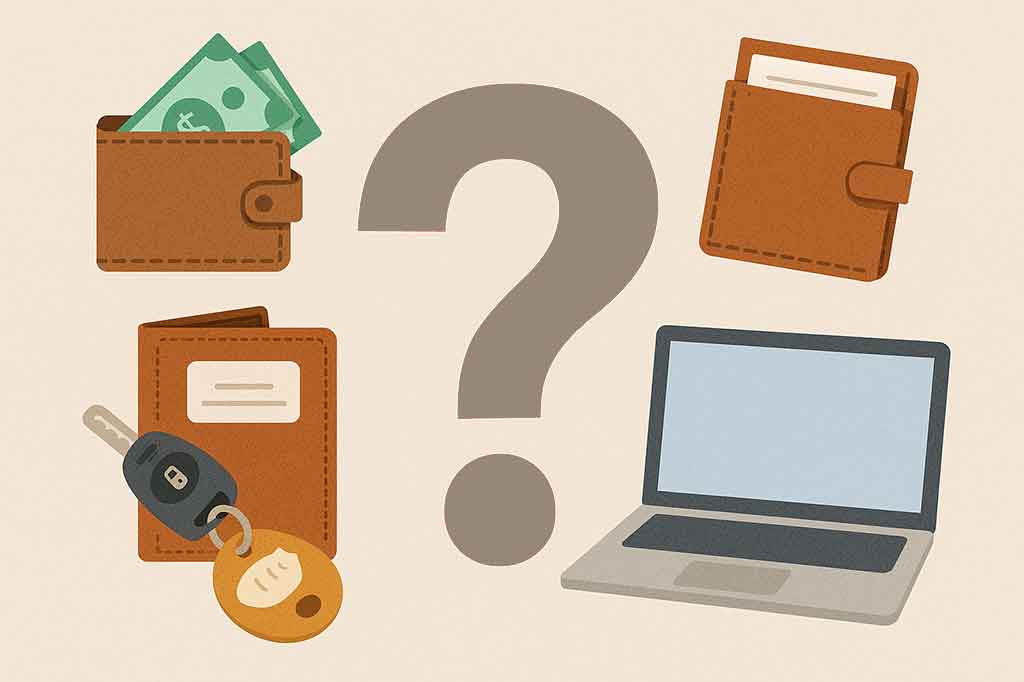
Your NYC Rental Questions Answered
Conclusion: You’ve Got This! Your NYC Apartment Adventure Awaits
And there you have it – my deep dive into the world of renting your first apartment in New York City, based on my own rollercoaster ride of experiences. From deciphering the 40x rule and budgeting for those sneaky hidden costs, to navigating the online and offline apartment hunt, mastering the art of the viewing, decoding lease agreements, and understanding your crucial tenant rights – we’ve covered a lot of ground. My hope is that by sharing my journey, my mistakes, and the lessons I’ve learned, I’ve managed to demystify this often-daunting process for you.
Renting in NYC isn’t always easy, I won’t lie. It can be competitive, expensive, and at times, downright frustrating. But I truly believe that with the right information, a solid plan, a healthy dose of patience, and a positive mindset, you absolutely can land a great apartment without draining your savings or losing your sanity. I did it, and countless others do it every single day. Now, it’s your turn.
Remember those feelings of excitement and empowerment I mentioned at the beginning? Hold onto those. This city is an incredible place to live, full of opportunities, energy, and experiences you won’t find anywhere else. Finding your own little slice of it, your first NYC apartment, is a huge milestone and a testament to your adventurous spirit.
So, take a deep breath. Use the tips and advice I’ve shared in this guide as your roadmap. Do your research, ask questions, trust your gut, and don’t be afraid to advocate for yourself. As this site grows, I’ll continue to share more insights, partner with local services that I trust, perhaps offer some affiliate products that I genuinely believe in, and maybe even launch a newsletter with curated listings and more in-depth advice. Your support and feedback will help keep it all going, allowing me to help even more first-time renters like you.
I truly believe that the NYC rental scene has gaps, and too many hopeful tenants fall through them. I’m here, and this blog is here, to help bridge that gap. Let this post be your first confident step towards not just finding an apartment, but finding a home in this magnificent city.
What are your biggest concerns about renting in NYC for the first time? Do you have any experiences or tips to share? Let me know your thoughts in the comments below – I’d love to hear from you! And if you found this guide helpful, please consider sharing it with anyone else embarking on their own NYC apartment adventure. Start today, discover more, and get ready to conquer the NYC rental market!
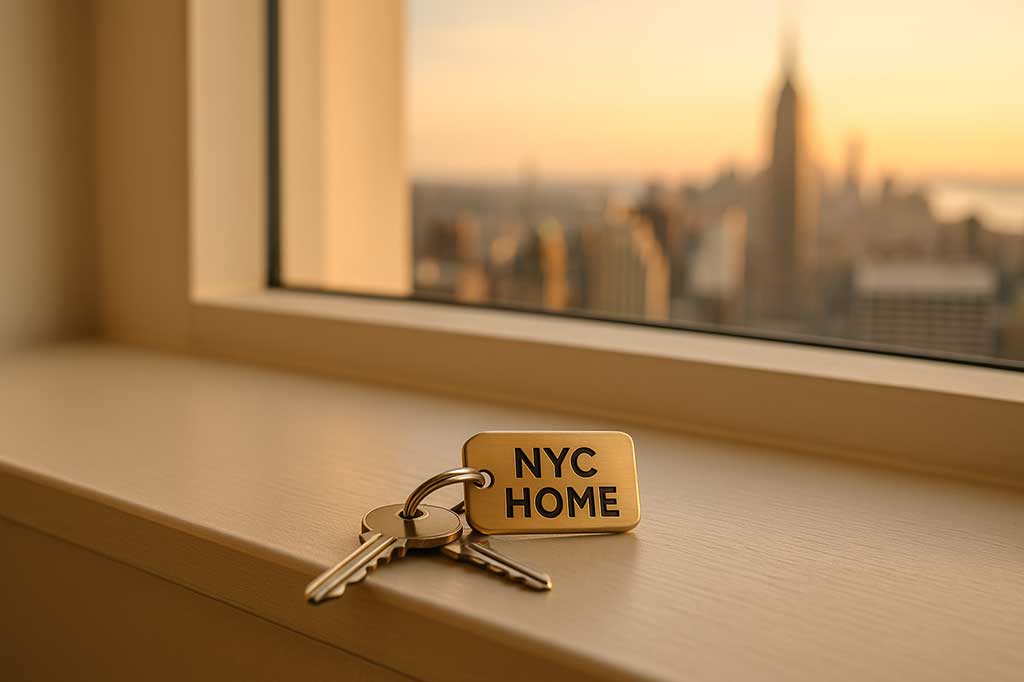
Home Sweet NYC-Mission Accomplished

